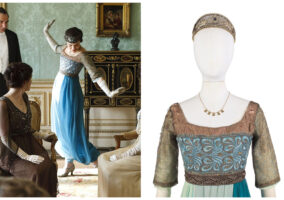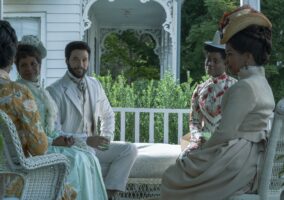Somewhere along the way, when we announced we’d be blogging Downton Abbey from the beginning, some people expressed  their extreme disappointment with the soon-to-be-aired-in-the-U.S. second season, dismissing it as having become a soap opera. This left us scratching our heads. “When was it ever NOT a soap opera?” From Mr. Pamuk checking out in flagrante, to the development -straight out of the Krystle & Alexis playbook – at the end of this season with O’Brien and Lady Grantham, this show has always been a well-directed, well-acted period soap opera. This has come up again in recent comments from readers who think we’re treating the show like great literature, which, we have to admit, is something we never expected to hear, considering we said the story wasn’t new, the show tends to use a lot of narrative cliches, and that the writing tends to stack the deck in favor or against certain characters. Make no mistake: we think the show is rich for discussion, beautiful to look at, and wonderfully cast, but we’d never accuse it of being
their extreme disappointment with the soon-to-be-aired-in-the-U.S. second season, dismissing it as having become a soap opera. This left us scratching our heads. “When was it ever NOT a soap opera?” From Mr. Pamuk checking out in flagrante, to the development -straight out of the Krystle & Alexis playbook – at the end of this season with O’Brien and Lady Grantham, this show has always been a well-directed, well-acted period soap opera. This has come up again in recent comments from readers who think we’re treating the show like great literature, which, we have to admit, is something we never expected to hear, considering we said the story wasn’t new, the show tends to use a lot of narrative cliches, and that the writing tends to stack the deck in favor or against certain characters. Make no mistake: we think the show is rich for discussion, beautiful to look at, and wonderfully cast, but we’d never accuse it of being  groundbreaking. As entertaining as this show is, we wouldn’t put it at the level of say, Mad Men or Boardwalk Empire in terms of depth and artistic reach. It’s fun and well done.
groundbreaking. As entertaining as this show is, we wouldn’t put it at the level of say, Mad Men or Boardwalk Empire in terms of depth and artistic reach. It’s fun and well done.
We bring this up now because this is the point in the story where they jumped into the serialized drama pool with both feet, as storylines took off in all directions and the framing device for everything from kitchen politics to inheritance drama was the one thing a every soap opera must have: troubled romance. Thomas is romancing Daisy just to screw around with William, who silently pines for the sweet but addle-headed servant girl. Mrs. Hughes suddenly finds the prospect of rekindled romance, and the offer of a life she never thought she’d have, which causes her to question her life choices and to offer William some of her hard-earned wisdom. Bates and Anna continue their whispered, backstair courtship, with rules and locked doors standing between them, making it all the sweeter for the two of them. And finally, the Dowager Countess draws  Matthew directly into the entail drama (even more than he already is), which not only sets him firmly on his way on the journey from middle class solicitor to lord of the manor, but also causes a growing sympathy toward Mary; a sympathy which looks for all the world like a burgeoning romance with the just the hint of reciprocation. This was Love, English Manor-Style because love wasn’t just in the air, it was driving all the major plot lines.
Matthew directly into the entail drama (even more than he already is), which not only sets him firmly on his way on the journey from middle class solicitor to lord of the manor, but also causes a growing sympathy toward Mary; a sympathy which looks for all the world like a burgeoning romance with the just the hint of reciprocation. This was Love, English Manor-Style because love wasn’t just in the air, it was driving all the major plot lines.
Downstairs, Daisy only has eyes for Thomas while William only has eyes for her. It’s as common a plotline with as likely an outcome as you’ll find in any soap opera. The one thing that made it interesting (other than William’s adorably heartbroken face) was the reveal that Mrs. Patmore is fully aware that Thomas is gay ( “He’s a lost soul.”), which means you can bet most of the rest of the staff is as well. We don’t find this to be all that plausible, especially in light of the inference last episode that even the family, or at least Lord Grantham, knows this about him, when Bates joked to him about Thomas’ eagerness to be Pamuk’s valet. It’s  absurd to think that so many people in such an insular setting a century ago would not only know that one of the servants is gay, but at most shrug about it. It’s not worth getting too upset over because for one, Thomas is a fun character and for another, no one’s looking at this show like a docudrama.
absurd to think that so many people in such an insular setting a century ago would not only know that one of the servants is gay, but at most shrug about it. It’s not worth getting too upset over because for one, Thomas is a fun character and for another, no one’s looking at this show like a docudrama.
Mary is riddled with guilt over her actions with Mr. Pamuk, as well as deeply fearful as to whether they will have any long-term effect on her life. In anguish, she echoes Mrs. Patmore’s view of Thomas by referring to herself as a “lost soul” to her mother. She’s not really in the best place for romance but the irony of it is, a true romance could be the one thing she needs the most right now. Cora and Violet both understand that without the estate behind her, Mary’s marrying prospects could dim quite quickly. As much as they both want to see her inherit the estate, their need to see her married off to anyone appropriate is gaining importance and becoming the focus of their efforts (although things aren’t quite so desperate that she needs to be shipped off to America).  Of course, Cora has a more pressing need to see her eldest daughter paired off than even Violet realizes.
Of course, Cora has a more pressing need to see her eldest daughter paired off than even Violet realizes.
This is all causing Mary to become fairly anxious and depressed about her lot in life, going so far as to admit to Matthew that she hates her life. Although pointedly, she mentions that she doesn’t hate him, an admission that causes them both to pause. Whatever bond they might have was further strengthened through their efforts to address the entail situation with her father and grandmother. Matthew won’t – and more importantly, can’t – break the entail, but he’s deeply saddened by what that means for Mary and the rest of the family. Mary, for her part, finds herself respecting him for his sincerity on the matter, much like Carson does.
Back downstairs, Mrs. Hughes finds herself wondering what her life would be like if she left service. But really, what she’s  wondering is what her life would have been like had she never entered service, and it’s to her great credit that she’s wise enough to understand the distinction. We found her story a little sad, but not really tragic in the end. She knows herself, she knows her life, and she’s content with both. “I’ve seen a bit of life and no mistake!” she tells her suitor, and the evidence of that is clear in her wisdom. We would detest even the hint of a romance with Mr. Carson, but we enjoy the unique nature of their relationship, which is spousal in a lot of ways, but without the intimacy and with an enormous wall of respect built up between the two of them.
wondering is what her life would have been like had she never entered service, and it’s to her great credit that she’s wise enough to understand the distinction. We found her story a little sad, but not really tragic in the end. She knows herself, she knows her life, and she’s content with both. “I’ve seen a bit of life and no mistake!” she tells her suitor, and the evidence of that is clear in her wisdom. We would detest even the hint of a romance with Mr. Carson, but we enjoy the unique nature of their relationship, which is spousal in a lot of ways, but without the intimacy and with an enormous wall of respect built up between the two of them.
As for Mr. Bates and Anna, well you could just eat them up with an ice cream spoon, they’re so sweet together.
In other, non-romantic house news, radical politics in the form of a new Irish chauffeur with a distinct lack of boundaries makes its arrival on Downton’s doorstep, to the delight of Sybil. His arrival not only awakens her political side, it spurs her to help Gwen  in her pursuit to better herself. She tops off her week of radical behavior by showing up for dinner in an outfit that acknowledges she has legs. This was played for comedy, which means you can once again toss any idea of historical context. At the very least you should expect the Dowager Countess to hit the roof, but she just seemed befuddled as everyone else smiled indulgently. What really grated about that scene was the way it ended with the grinning chauffeur peering in from outside. That has to be some of the dumbest, clumsiest staging we’ve ever seen. Like something out of a cola commercial rather than a period drama.
in her pursuit to better herself. She tops off her week of radical behavior by showing up for dinner in an outfit that acknowledges she has legs. This was played for comedy, which means you can once again toss any idea of historical context. At the very least you should expect the Dowager Countess to hit the roof, but she just seemed befuddled as everyone else smiled indulgently. What really grated about that scene was the way it ended with the grinning chauffeur peering in from outside. That has to be some of the dumbest, clumsiest staging we’ve ever seen. Like something out of a cola commercial rather than a period drama.
And finally, Violet and Isobel locked horns once again, with poor old Mosely caught in the middle this time. We suppose it’s good they gave Isobel just a little bit of a comeuppance, otherwise she’d be a bit too saintly and perfect a character. Besides, watching Maggie Smith cut someone off at the knees is half the reason to watch, no?
[Screencaps: tomandlorenzo.com]
Downton Abbey S1E3: Something About Mary Next Post:
Happy New Year!!
Please review our Community Guidelines before posting a comment. Thank you!



